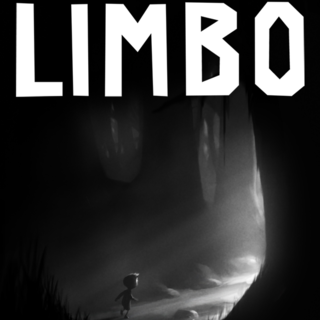Limbo is like Braid only in that it's an indy, artsy game with lots of puzzles. That's where the similarities end.
Braid wasn't just a weird art game. It was a great puzzle game that brilliantly introduced some time manipulation mechanics into a traditional 2D platformer. Limbo brings nothing to the table from a gameplay standpoint. It is a sidescrolling game with a key to jump and a key to manipulate stuff in the environment. You time jumps as precisely as possible. You push blocks so that you can climb on top of them to progress further. You activate switches and stuff. Other than some interesting gravity shifting parts near the end of the game, it is all very mundane, and it has all been done better by somebody else. This wouldn't be a huge problem, were it not for the fact that Limbo fails to deliver a high level of polish to its simple gameplay. The biggest culprit here is the controls. The controls – especially the jump – are slow to respond and about as sluggish as the controls for any platformer that I have ever played. The game is loaded with "LOL gotcha" traps that are impossible to avoid without lots of trial and error – in no small part because the sluggish controls prevent you from reacting to anything that you see in real time. Chances are, you will kill yourself accidentally a few times by running off the edge of a ledge and pressing the jump key a split second too late because of the game's slow response.
Limbo is also totally devoid of story. Braid at least had some narrative that you could pick up by reading in-game materials, and it had a great twist on the last level. If that game was a student film, Limbo is more like a music video – stylish but pointless. You play as a boy traversing what looks like a spiritual realm or afterlife (and the only reason that you know this is the title of the game, "Limbo"). There is not one drop of in-game exposition. After you beat the last puzzle, you meet up with a female silhouette of some kind and the game ends. That's it.
I have mentioned "style" in this review a few times, and that is because it is the one thing that Limbo has in spades. From a visual and audio standpoint, it is wonderfully done. If the setting is not the afterlife, then it feels like some kind of nightmare. The monochromatic graphics provide a stunning level of detail, considering that no color palette was available. There is a haze to the graphics that adds to the game's dreamlike quality. There is almost no music in the game, which in this case is a great decision. The quiet is rarely punctuated by anything more than the sound of machinery or traps crushing you into bloody pieces. Towards the end, some subtle music picks up to let you know that you are approaching the climax of the game. It all combines to produce a macabre atmosphere that will always have you feeling on edge, even though it is not a particularly intense or scary game.
Limbo is pretty short. An experienced gamer can finish it in an afternoon, and that time involves trial-and-error and replaying short bits after you have gotten killed. There's essentially no replay value to the game, so whether it's worth playing depends on whether you can get it cheap. Now that it has been out for a while, the price has probably dropped to the point where it is worth checking out if the style sounds like it appeals to you. Just make sure not to let your expectations get up too high.

